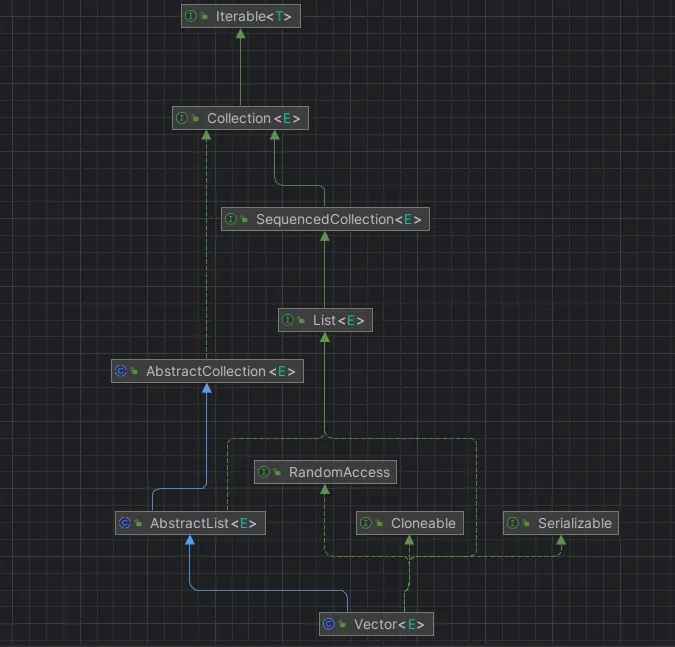请注意,本文编写于 506 天前,最后修改于 506 天前,其中某些信息可能已经过时。
上次听到这个还是在cpp,定义不能说和ArrayList一模一样,只能说毫无差别,听说就是个加了同步块的ArrayList
javapublic class Vector<E>
extends AbstractList<E>
implements List<E>, RandomAccess, Cloneable, java.io.Serializable
看看继承关系
 基础属性
基础属性
java /**
* The array buffer into which the components of the vector are
* stored. The capacity of the vector is the length of this array buffer,
* and is at least large enough to contain all the vector's elements.
*
* <p>Any array elements following the last element in the Vector are null.
*
* @serial
*/
@SuppressWarnings("serial") // Conditionally serializable
protected Object[] elementData;
/**
* The number of valid components in this {@code Vector} object.
* Components {@code elementData[0]} through
* {@code elementData[elementCount-1]} are the actual items.
*
* @serial
*/
protected int elementCount;
/**
* The amount by which the capacity of the vector is automatically
* incremented when its size becomes greater than its capacity. If
* the capacity increment is less than or equal to zero, the capacity
* of the vector is doubled each time it needs to grow.
*
* @serial
*/
protected int capacityIncrement;
/** use serialVersionUID from JDK 1.0.2 for interoperability */
@java.io.Serial
private static final long serialVersionUID = -2767605614048989439L;
Vector没有像ArrayList那么设计,很直接
java /**
* Constructs an empty vector with the specified initial capacity and
* capacity increment.
*
* @param initialCapacity the initial capacity of the vector
* @param capacityIncrement the amount by which the capacity is
* increased when the vector overflows
* @throws IllegalArgumentException if the specified initial capacity
* is negative
*/
public Vector(int initialCapacity, int capacityIncrement) {
super();
if (initialCapacity < 0)
throw new IllegalArgumentException("Illegal Capacity: "+
initialCapacity);
this.elementData = new Object[initialCapacity];
this.capacityIncrement = capacityIncrement;
}
/**
* Constructs an empty vector with the specified initial capacity and
* with its capacity increment equal to zero.
*
* @param initialCapacity the initial capacity of the vector
* @throws IllegalArgumentException if the specified initial capacity
* is negative
*/
public Vector(int initialCapacity) {
this(initialCapacity, 0);
}
/**
* Constructs an empty vector so that its internal data array
* has size {@code 10} and its standard capacity increment is
* zero.
*/
public Vector() {
this(10); // 没有延时
}
/**
* Constructs a vector containing the elements of the specified
* collection, in the order they are returned by the collection's
* iterator.
*
* @param c the collection whose elements are to be placed into this
* vector
* @throws NullPointerException if the specified collection is null
* @since 1.2
*/
public Vector(Collection<? extends E> c) {
Object[] a = c.toArray();
elementCount = a.length;
if (c.getClass() == ArrayList.class) {
elementData = a;
} else {
elementData = Arrays.copyOf(a, elementCount, Object[].class);
}
}
基础操作函数
java public synchronized boolean add(E e) {
modCount++;
add(e, elementData, elementCount);
return true;
}
public synchronized E set(int index, E element) {
if (index >= elementCount)
throw new ArrayIndexOutOfBoundsException(index);
E oldValue = elementData(index);
elementData[index] = element;
return oldValue;
}
public synchronized E get(int index) {
if (index >= elementCount)
throw new ArrayIndexOutOfBoundsException(index);
return elementData(index);
}
这些方法都加上了synchronized,实现了线程安全,但是效率低,还有就是扩容机制,2倍,延迟默认初始化等等,细节上要少于ArrayList,但是ArrayList线程不安全
本文作者:yowayimono
本文链接:
版权声明:本博客所有文章除特别声明外,均采用 BY-NC-SA 许可协议。转载请注明出处!